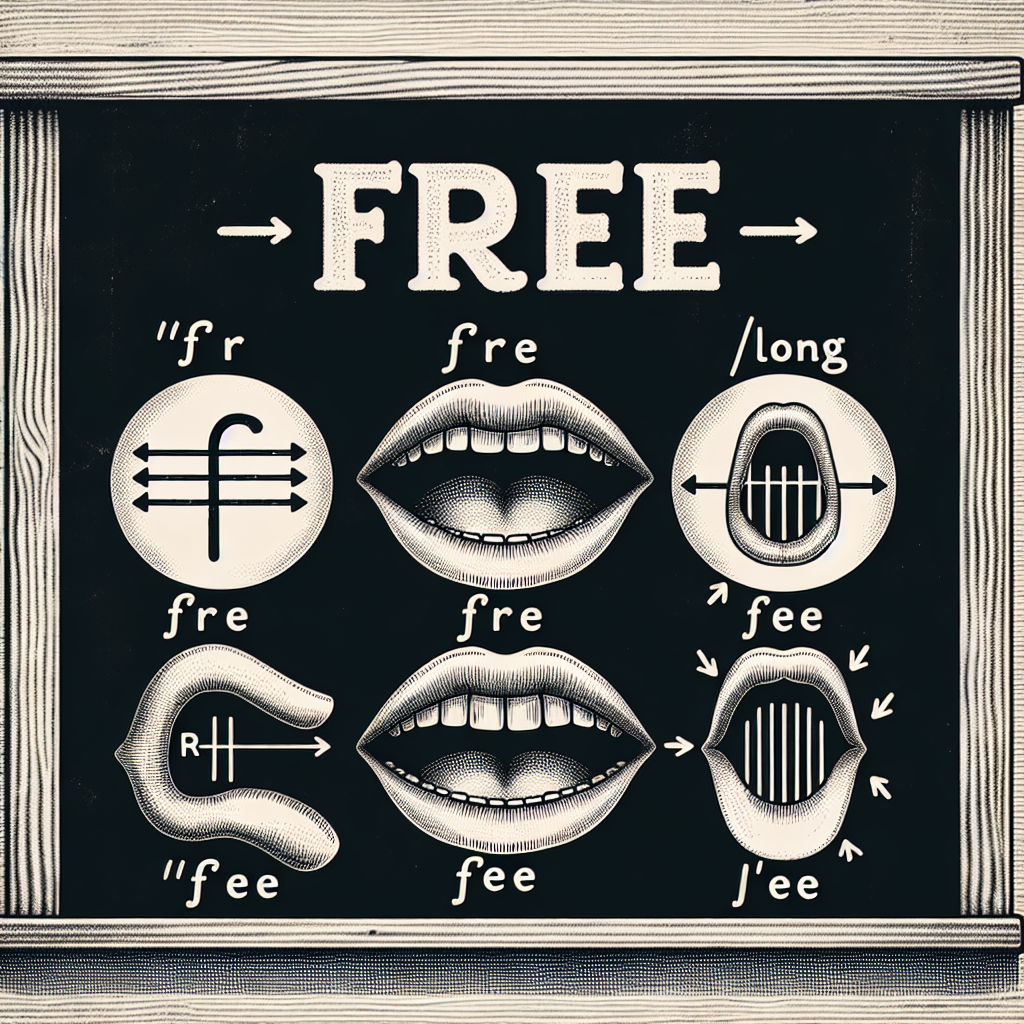-
Table of Contents
- How to Pronounce “Free” in English
- The Standard Pronunciation of “Free”
- Regional Variations in Pronunciation
- 1. American English Pronunciation
- 2. British English Pronunciation
- Common Mispronunciations of “Free”
- 1. Mispronunciation: “Fray”
- 2. Mispronunciation: “Fruh”
- Tips for Improving Your Pronunciation of “Free”
- Q&A
- 1. Is there a correct or incorrect way to pronounce “free”?
- 2. Why do some people mispronounce “free”?
- 3. How can I overcome my difficulties in pronouncing “free”?
- 4. Are there any other words similar to “free” that I should be aware of?
- 5. Can mispronouncing “free” affect my communication skills?
- Summary
How to Pronounce “Free” in English

When it comes to pronouncing words in English, there can often be confusion due to the language’s complex phonetic rules. One such word that can cause uncertainty is “free.” In this article, we will explore the various ways to pronounce “free” in English, providing valuable insights and examples to help you master its pronunciation.
The Standard Pronunciation of “Free”
The most common and widely accepted pronunciation of “free” in English is /friː/. This pronunciation follows the standard rules of English phonetics, where the “ee” vowel sound is long and pronounced as /iː/. To pronounce “free” correctly, follow these steps:
- Start with the /f/ sound, which is produced by placing the top teeth on the lower lip and releasing a burst of air.
- Move on to the long /iː/ sound by positioning the tongue high and towards the front of the mouth, with the lips slightly spread.
- Finally, end with the /r/ sound, which is produced by slightly curling the tip of the tongue towards the roof of the mouth.
By following these steps, you will be able to pronounce “free” in its standard form.
Regional Variations in Pronunciation
English is a language spoken in various regions around the world, and as a result, there are regional variations in pronunciation. While the standard pronunciation of “free” is widely accepted, it is important to note that there are some regional differences. Let’s explore a few of these variations:
1. American English Pronunciation
In American English, the pronunciation of “free” can sometimes be slightly different from the standard pronunciation. Instead of the long /iː/ sound, some Americans pronounce it with a shorter /ɪ/ sound. This means that “free” may sound more like “frih” or “frɪ” in certain American accents.
2. British English Pronunciation
In British English, the pronunciation of “free” generally follows the standard pronunciation. However, there are some regional accents in the UK where the long /iː/ sound is pronounced as a diphthong, combining the sounds /iː/ and /əʊ/. This can result in “free” sounding more like “friəʊ” in certain British accents.
Common Mispronunciations of “Free”
Despite the standard and regional variations in pronunciation, there are also common mispronunciations of “free” that can be observed. These mispronunciations often occur due to the influence of other languages or regional accents. Let’s take a look at a few examples:
1. Mispronunciation: “Fray”
Some non-native English speakers or individuals with certain regional accents may mistakenly pronounce “free” as “fray.” This mispronunciation occurs when the long /iː/ sound is replaced with the /eɪ/ diphthong, resulting in a different pronunciation altogether.
2. Mispronunciation: “Fruh”
Another common mispronunciation of “free” is “fruh.” This mispronunciation occurs when the long /iː/ sound is replaced with the short /ʌ/ sound. It can be observed in certain regional accents or by individuals who are not familiar with the standard pronunciation.
Tips for Improving Your Pronunciation of “Free”
If you find yourself struggling with the pronunciation of “free” or any other English word, here are some tips to help you improve:
- Listen to native English speakers: Pay attention to how native speakers pronounce “free” and other words. Mimicking their pronunciation can help you develop a more accurate pronunciation.
- Practice with phonetic symbols: Familiarize yourself with the International Phonetic Alphabet (IPA) symbols for English sounds. This can help you understand the correct pronunciation of words.
- Use pronunciation apps or websites: There are numerous apps and websites available that provide audio recordings and pronunciation exercises. Utilize these resources to practice your pronunciation.
- Record yourself: Record yourself pronouncing “free” and listen to the recording. Compare it to native speakers’ pronunciation and identify areas for improvement.
Q&A
1. Is there a correct or incorrect way to pronounce “free”?
While there are regional variations in pronunciation, the standard pronunciation of “free” is /friː/. However, it is important to note that language is constantly evolving, and pronunciations can vary based on dialects and accents. As long as you are understood by others, your pronunciation can be considered correct.
2. Why do some people mispronounce “free”?
People may mispronounce “free” due to a variety of reasons. It could be influenced by their native language, regional accents, or lack of exposure to the standard pronunciation. Additionally, some individuals may simply have difficulty with certain sounds or phonetic patterns.
3. How can I overcome my difficulties in pronouncing “free”?
Improving your pronunciation of “free” or any other word requires practice and exposure to native speakers. Listening to and mimicking native speakers, using phonetic symbols, and utilizing pronunciation resources can all help you overcome difficulties in pronunciation.
4. Are there any other words similar to “free” that I should be aware of?
Yes, there are several words in English that have similar pronunciation patterns to “free.” Some examples include “tree,” “see,” “me,” and “key.” Paying attention to the pronunciation of these words can further enhance your understanding and mastery of the English language.
5. Can mispronouncing “free” affect my communication skills?
While mispronouncing “free” or any other word may not significantly impact your communication skills, it can sometimes lead to misunderstandings or difficulties in comprehension. However, it is important to remember that effective communication involves more than just pronunciation, and focusing on overall language proficiency is key.
Summary
Pronouncing “free” correctly in English is essential for effective communication. While the standard pronunciation is /friː/, regional variations and common mispronunciations exist. By listening to native speakers, practicing with phonetic symbols, and utilizing pronunciation resources, you can improve your pronunciation skills. Remember, language is dynamic, and as long as you are understood, your pronunciation can be considered correct. So, keep practicing and embracing the beauty of English pronunciation!







